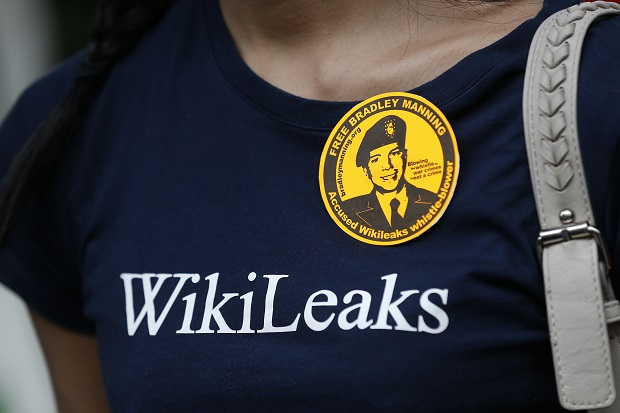WikiLeaks: US spied on last 3 French presidents

In this Wednesday, August 21, 2013 file photo, a supporter of WikiLeaks protests outside the U.S. Embassy in London. WikiLeaks has published documents it says shows the U.S. National Security Agency eavesdropped on the last three French presidents. There was no immediate confirmation of the accuracy of the documents released by French daily newspaper Liberation and investigative website Mediapart late on Tuesday, June 23, 2015. AP
PARIS, France — WikiLeaks published documents late Tuesday that it says show the U.S. National Security Agency (NSA) eavesdropped on the last three French presidents, releasing material which appeared to capture officials in Paris talking candidly about Greece’s economy, relations with Germany — and, ironically, American espionage.
There was no instant confirmation of the accuracy of the documents released in collaboration with French daily newspaper Liberation and investigative website Mediapart, but WikiLeaks has a track record of publishing intelligence and diplomatic material and the release appeared serious enough to prompt an emergency meeting of President Francois Hollande’s defense council, according to a presidential aide. The council, meeting Wednesday morning, includes France’s top security officials.
READ: WikiLeaks reveals Saudi intrigue and unpaid limo bills | WikiLeaks dumps 276,000 more documents from Sony hack
WikiLeaks spokesman Kristinn Hrafnsson told The Associated Press he was confident the documents were authentic, noting that WikiLeaks’ previous mass disclosures — including a large cache of Saudi diplomatic memos released last week — have proven to be accurate.
The timing of the release was not accidental: It came a day before the French Parliament is expected to definitively pass a controversial security bill legalizing broad surveillance, particularly of terrorism suspects.
Article continues after this advertisementHollande’s office did not comment on the reports other than to announce the security meeting.
Article continues after this advertisementAn aide to Hollande’s predecessor Nicolas Sarkozy told the AP that the former president considers these methods unacceptable, generally speaking and especially from an ally. The aide was not authorized to be publicly named.
There was no comment Tuesday from former President Jacques Chirac, also reportedly targeted by the eavesdropping.
U.S. National Security Council spokesman Ned Price said in a statement that the American government would not comment on the specifics of the leak.
“As a general matter, we do not conduct any foreign intelligence surveillance activities unless there is a specific and validated national security purpose. This applies to ordinary citizens and world leaders alike,” he said.
Ever since documents leaked by former NSA contractor Edward Snowden showed in 2013 that the NSA had been eavesdropping on the cellphone of Angela Merkel, it had been understood that the U.S. had been using the digital spying agency to intercept the conversations of allied politicians. The new revelations are bound to cause diplomatic embarrassment for the Americans, even though friends have been spying on friends for thousands of years.
Late on Tuesday, several French politicians posted messages to social media voicing their disgust with the reports.
“And one more time we find out that the U.S. has no allies, they only have targets or vassals,” Socialist lawmaker Jean-Jacques Urvoas said in messages posted on Twitter in both French and English.
Hollande said last year that he discussed his concerns about NSA surveillance with President Barack Obama during a visit to the U.S., and they patched up their differences.
After the Merkel disclosures, Obama ordered a wholesale review of NSA spying on allies, after officials suggested that senior White House officials had not approved many operations that were largely on auto-pilot. After the review, American officials said Obama had ordered a halt to spying on the leaders of allied countries, if not their aides.
WikiLeaks, on its website, listed the contents of what it said were five selected “top” intercepts of communications involving French presidents — on subjects including a top U.N. appointment, the Middle East peace process, and the handling of the euro crisis — between 2006 and 2012.
The site also listed in a chart what were said to be phone numbers listed by NSA as top French official “intercept targets,” including that of the French president’s own cellphone, with some digits crossed out.
Hrafnsson refused to comment on how WikiLeaks had obtained the documents and declined to go into specifics about what else might be appearing in the French press, but said that “they can expect more revelations in the near future.”
Privacy advocates and human rights groups have protested the new French surveillance bill, which allows intelligence services to vacuum up metadata in hopes of preventing imminent attacks. But the government argues that it is just updating a 1991 law to grapple with modern threats and has tried to distance itself from U.S.-style mass surveillance.
The bill was proposed last year but deadly Paris attacks by Islamic extremists in January gave it added urgency for the government.